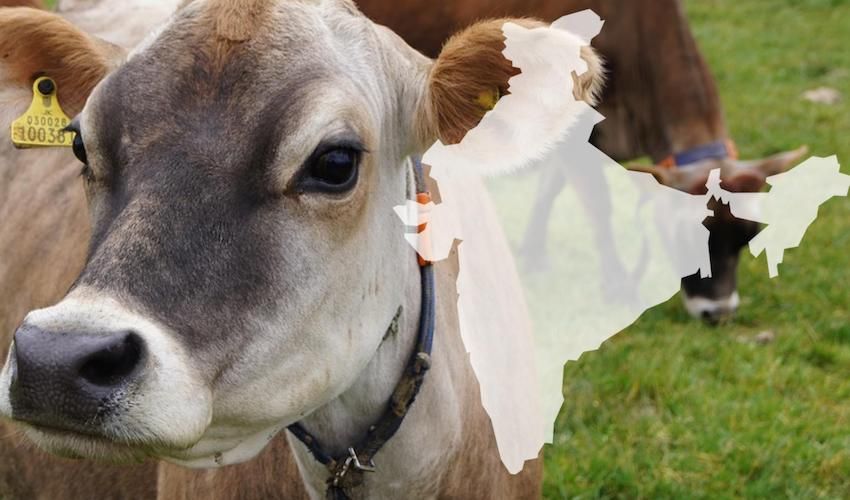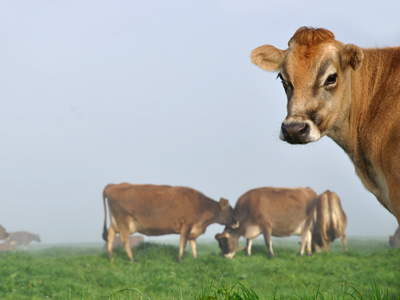


Jersey Cows have been at the centre of protests in India, where its claimed that they are killing off the local breed, destroying heritage, producing harmful milk, and even hurting the environment - with their "belches."
Some decades ago, the Tamil Nadu government started to discourage local bovine breeding, instead favouring the Jersey Cow and Holstein Friesian for their higher yields of quality milk.
As a result, foreign cows are now imported once every two years, with Jersey Cows a consistently popular choice.

Pictured: Tamil Nadu, the region in which the bovine protests are taking place. (Photo: Google Maps/Bailiwick Express)
“As far as farmers are concerned, the trouble with indigenous breeds is that they produce much less milk than Jersey cows. If the former gives you six litres a day, the latter manages 15 litres,” explained Dr. Meril Raj, Veterinary Assistant Surgeon at the Government Veterinary Dispensary.
But that’s a moot point according to locals. They say that they have beef with the immigrant Jersey cows stealing native ‘desi’ cow’s jobs, and that they’re costing farmers dearly, as they require higher maintenance and more grazing pastures.
University researchers have rallied against the cows too, stating that their “belches” are puncturing the ozone layer – something that sacred Indian cows apparently do not.
Published by Gujurat Ayurveda University, the report read: “In India, we prefer our original zero-maintenance desi cow, rather than fat Jersey cows that keep eating and drinking through the day, fall sick more often and have to be pumped full of antibiotics. These cows fart methane gas, so often that the ozone layer has got a hole.”

Pictured: Jersey cows not only harm the environment with their methane-filled wind expulsions, their milk also causes diseases, campaigners claim.
Human as well as environmental health is also allegedly at risk.
Numerous websites and videos across the internet assert that Jersey cow milk, “…is linked to heart diseases, diabetes, etc”, while “Holy Indian Cow” milk, “…is a link to solving medical mysteries, from diabetes to autism.” One such video – entitled ‘Do Not Drink Jarsi Cow Milk’ – has gained over 350,000 views.
Tensions, however, came to a head after the Tamil Nadu government recently issued a PETA-backed crackdown on ‘Jallikattu’, an Indian bullfighting tradition – one of the few remaining practices for which indigenous cows are preferred.
Not only did many flock to social media to air frustrations, but protests broke out across the region, lasting well over a week.
#Kambala v/s #Jallikattu: How much do you know about these traditional sports | https://t.co/lRsYXfP62A pic.twitter.com/RkkKrBAXG6
— Bangalore Mirror (@BangaloreMirror) January 27, 2017
Demonstrators came out in force, carrying posters including slogans such as, “We don’t want either Jessie or Jersey,” – “Jessie” referring to a character played by a PETA-supporting Indian actress.
As references to Coke and Pepsi began to emerge on the same posters as Jersey cows were condemned, it soon became clear that they were no longer a mere point of agricultural contention, but a symbol of a Western assault on Tamil culture.
As 30-year-old blogger Muthu explained to Indian newspaper The Hindu, “So many of our native breeds have disappeared. The nattu kozhi (country hen) is gone. We breed German Shepherds while native dogs roam stray on the streets. Jallikattu is a way of preserving at least the native breeds of cattle.”
@rparthiepan Supported Jallikattu on Sunday evening.
— Naveen M (@naveen44pnk) January 25, 2017
Sorry for uploading too late ..!#JallikattuForever #jallikattu #Jallikattuprotest pic.twitter.com/CZScXKCUgJ
By day five, the government had issued an ordinance allowing Jallikattu to continue. The previously peaceful protest still deteriorated, however.
At its worst moments, protestors threw stones and set vehicles and police stations alight, while police were forced to use tear gas on the rowdy crowds.
Nonetheless, such activism did little to halt the government’s decision to fly in around 60 Jersey cows to Chennai airport.
A video of the import, which has been viewed over 400,000 times, was leaked onto Facebook, and subsequently got ‘#banjersi’ trending.
Physical protests may have subsided for now, but the cattle battle rages on.
Comments
Comments on this story express the views of the commentator only, not Bailiwick Publishing. We are unable to guarantee the accuracy of any of those comments.